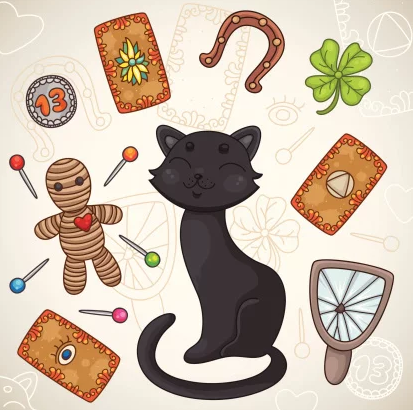Halloween is cooomiiing! Every year shortly before Halloween a teacher has a problem about how to surprise students, make them more interested in American and English culture, entertain them and engage in the lesson and English learning in general and, of course, teach them something new. Why not talk about mystery and superstitions
Семь таблиц с готовыми планами урока, десятки упражнений и разминок в дайджесте: Хэллоуин для преподавателей: факты, упражнения и планы уроков
In this article, you can find some ideas that you can use to plan your lesson on the topic “Superstitions” based on a TED talk video. These activities can be used with Intermediate+ level students for both individual and group lessons.
Warm-up
To start with, show the picture to a student and ask them what he/she sees and how these objects might be connected. Ask them whether they know what superstition is.

Key: This picture represents different superstitions, believes in things that are not real or possible, for example, a black mirror, a black cat crossing the street, voodoo doll, number 13 are considered to be negative superstitions. Four-leaved clover and a horseshoe bring good luck.
Then ask a student what superstitions exist in their country and if he/she knows superstitions that exist in other countries. Show the next picture to the student and discuss the superstitions connected with the things in the picture. If you work with a group of students, they can discuss the issue in pairs and then you can summarize ideas with the whole class.
Key: Numbers 13 and 4 (in China) are thought to be unlucky, as well as a cat crossing the street. People believe that one shouldn’t walk under the ladder because it brings you bad luck. Fingers are usually crossed to attract good luck. You can read about superstitions in the UK here.
Listening practice
After discussing superstitions, ask a student, why he/she thinks superstitions appear. Ask him whether they know the origin of any superstitions. Play the video and ask the student to notice the superstitions mentioned in the video and what story or belief stands behind each of them:
After watching the video, discuss what superstitions he/she has seen in the video and what he/she has noticed and remembers. If necessary, watch the video again to get more details. You can switch the video on once again without sound, stop the video and ask the student to tell what he/she sees.
Discuss with the student the following questions:
- Can superstitions be harmful? Which of them are more harmful — positive or negative?
- Where do most superstitions come from?
- Does the student do anything, which was mentioned in the video?
- What superstitions should people get rid of?
- What does the student feel on Friday 13th?
Reading practice
Read the article Superstitions: Friday 13th — unlucky for you? and make the student answer the question: “Why do some people want to be unlucky?” Under the article, there is a list of useful words and phrases with definitions. Make the student practice new words using Quizlet (here is the link for these words and phrases set). Ask a student to read the article again and answer the questions:
How many people in Britain are superstitious? Why are they careful about black cats?
And additional questions to discuss:
- What do you think about superstitions?
- Are people in your country superstitious?
- What sort of customs do they have?
- What can you do to prevent bad things from happening?
- Would you change your phone number or home address to avoid ‘bad numbers’?
- Do you believe that some materials are lucky/unlucky (such as gold, silk, etc.)?
- Where does the expression “Bless you” or “God bless you” (when someone sneezes) come from?
- Do you have any objects that are said to bring good luck, such as a rabbit’s foot, a lucky coin, etc.?
- Can the location of a house or the position of furniture bring good or bad luck?
An idea for the hometask
As homework, the student can read the article The scientific reason you still believe in superstitions. He/she can make a short research on superstitions that exist in their country and look up the history or legend about each of them. In the next lesson, the student presents what he/she has discovered.














 Олеся Яресько
Олеся Яресько 
 Диляра Биктагирова
Диляра Биктагирова 

 Маргарита Аветисян
Маргарита Аветисян 
